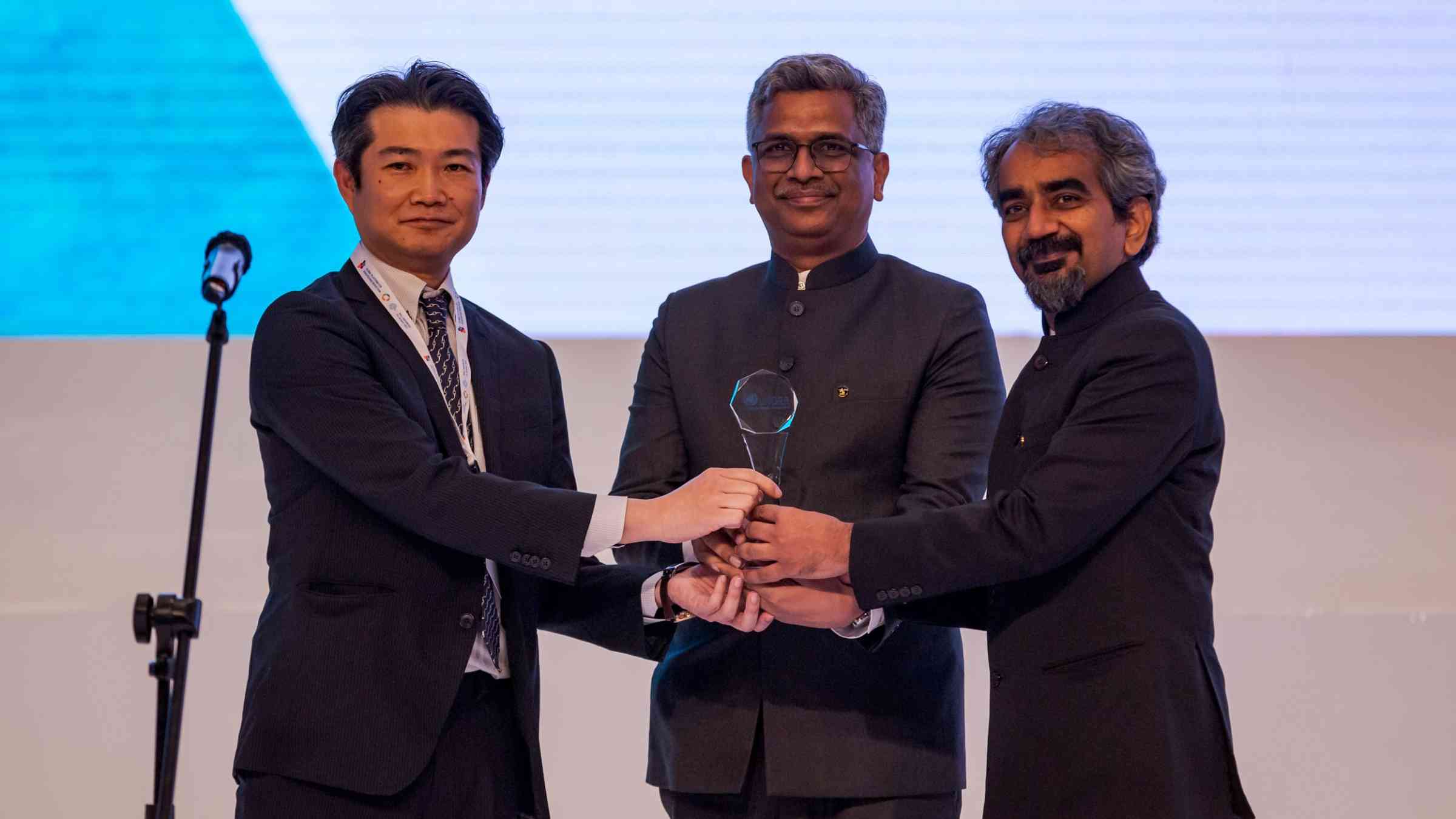Please help us improve PreventionWeb by taking this brief survey. Your input will allow us to better serve the needs of the DRR community.
SEEDS wins the United Nations Sasakawa Award 2022 for Disaster Risk Reduction

Masato Seko, Senior Program Director of Global Issues Department, The Nippon Foundation presents the UN Sasakawa Award 2022 for Disaster Risk Reduction to Dr Manu Gupta and Dr Anshu Sharma, Founders, SEEDS
Bali, Indonesia & New Delhi: SEEDS (Sustainable Ecological & Environmental Development Society), South Asia’s foremost non-profit organisation working in the field of disaster risk reduction and climate change was awarded the United Nations Sasakawa Award 2022 for Disaster Risk Reduction at the ongoing 7th Session of Global Platform for Disaster Risk Reduction (GPDRR) 2022 in Bali, Indonesia. The United Nations Sasakawa Award for Disaster Risk Reduction is a global award established in 1986 by the founding Chairman of the Nippon Foundation, Mr Ryoichi Sasakawa for recognising excellence in reducing disaster risk.
SEEDS has been working with the communities across South Asia over for the last 28 years. By combining local wisdom with modern science and technology, SEEDS has been building resilience among communities who are at a risk of the climate crisis and disasters. This award recognises SEEDS’ efforts in adopting a multi-hazard approach and its commitment to accountability and transparency in responding to climate emergencies.
“We are delighted and humbled by this award. It has been 28 years since we took up the mission to help build resilience among vulnerable communities. As we grapple with the global climate crisis, it is imperative for all of us to think of innovative ways, embrace technology as a leverage, and empower people to thrive despite recurring disasters. With the 2030 horizon for the Sendai Framework, SEEDS will continue building resilient communities through a holistic, inclusive, and multi-hazard approach,” said Dr Manu Gupta and Dr Anshu Sharma, co-founders, SEEDS.
In this nearly three-decade-long journey, SEEDS has rebuilt more than 62,000 homes, 650 schools and healthcare facilities, carried out school safety programmes for more than a quarter million children, developed disaster management plans for 500+ communities, provided emergency assistance to more than 830,000 people and positively impacted the lives of more than six million people.
Recognising the efforts of the awardees, Masato Seko, Senior Program Director of Global Issues Department, The Nippon Foundation said, “The UN Sasakawa Award was established in 1986, well before the time of SDGs when the awareness of Disaster Risk Reduction (DRR) was limited compared to today. It is not enough to build truly inclusive and resilience societies. We must act to mitigate the negative impact of natural disasters. We must emphasise the need to put people at high risk at the centre for disaster management. Even in time of peace. It is vital to utilise perspectives, knowledge and experience of local people involved in risk reduction. At the same time involvement of all stakeholders such as governments, NGOs, businesses and research institutions, media and most importantly people of the community are needed to strengthen policies and activities for risk reduction.”
The UN Sasakawa Award is a testimony to SEEDS’ extensive work with communities in building community risk registers, setting up early warning systems, and developing customised disaster management plans. The organisation has pioneered the use of Artificial Intelligence through its program Sunny Lives, to identify and anticipate disaster risk to human settlements and translate insights into actionable warnings for people. Across South Asia, SEEDS has adopted participatory approaches and worked with local leaders through citizen forums, government-civil society coordination mechanisms, and elected bodies to integrate and mainstream disaster risk reduction (DRR).
About SEEDS
SEEDS (Sustainable Environment and Ecological Development Society) is a not-for-profit organisation that enables community resilience through practical solutions in the areas of disaster readiness, response and rehabilitation. Since 1994, the organisation has worked extensively on every major disaster in the Indian subcontinent – grafting innovative technology on to traditional wisdom. It has reached out to families affected by disasters and climate stresses; strengthened and rebuilt schools and homes; and has invariably put its faith in skill-building, planning and communications to foster long-term resilience.
SEEDS is also India’s first agency to be verified on the parameters of the global Core Humanitarian Standards (CHS) – an international certification system for quality and accountability in humanitarian response. SEEDS has been awarded with the most prestigious annual Subhash Chandra Bose Aapda Prabandhan 2021 by the Government of India acknowledging the invaluable contribution and selfless service rendered by individuals and organisations in India in the field of Disaster Management. SEEDS completed 28 years of outstanding service to humanity in January 2022 and is re-anchoring its approach to building resilience through innovation. It continues to empower the most vulnerable across Asia to build a better future.
Explore further
Please note: Content is displayed as last posted by a PreventionWeb community member or editor. The views expressed therein are not necessarily those of UNDRR, PreventionWeb, or its sponsors. See our terms of use
Is this page useful?
Yes No Report an issue on this pageThank you. If you have 2 minutes, we would benefit from additional feedback (link opens in a new window).